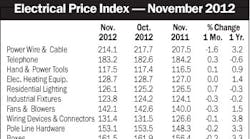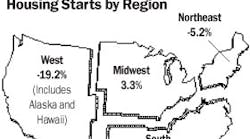Latest from Mag
People - Dec 21, 2012
Obituaries - Dec 21, 2012
November EPI Index Shows No Change
Housing Starts Dip 4% in November
Electrical Marketing - December 21, 2012
Around the Industry - Dec 21, 2012
Driven by attractive mortgage rates and strong house-price performance, sales of new single-family homes continued at a near-record seasonally adjusted annual rate of 1.145 million units in September, the Commerce Department reported. This is virtually unchanged from August’s heady pace of 1.147 million units, and concludes the best quarter on record for new-home sales.
“Housing continues to provide major muscle to the national economy as we head toward the end of the year,” said Kent Conine, president of the National Association of Home Builders (NAHB) and a home and apartment builder from Dallas. “Thanks in large part to today’s excellent financing conditions that are lowering the threshold for first-time home buyers, sales of both new and existing homes are headed toward record-breaking highs in 2003.”
“Residential fixed investment unquestionably boosted the national economy in the third quarter,” agreed NAHB Chief Economist David Seiders. “Moreover, thin inventories of unsold homes, a 5.6 percent year-over-year gain in the median price of new homes in September, and an increase in NAHB’s October Housing Market Index (a gauge of builder confidence) offer sound evidence that considerable strength remains in this market.” Solid demographic fundamentals, including strong immigration, are also major factors underpinning demand for housing, he said.
The inventory of new homes for sale in September remained essentially flat at a very healthy 342,000 units, or an historically low 3.7 months’ supply at the current sales rate.
The Northeast posted an impressive 26 percent gain in new-home sales in September for the largest increase of any region. The West also posted a double-digit gain, of 12.4 percent, while the South registered a modest 2.5 percent decline and the Midwest showed an 18 percent drop-off from an unsustainably high number in the previous month.
“Today’s report is evidence of the continuing solid performance of the housing market and its crucial contribution to the American economy,” Seiders concluded. “If there’s anything troubling on the horizon, however, it’s the Administration’s attempt to re-regulate Fannie Mae and Freddie Mac and possibly eliminate their GSE status. This effort has the potential to adversely affect capital flows to housing finance and raise home mortgage rates, which could seriously undermine the economic recovery process.”

